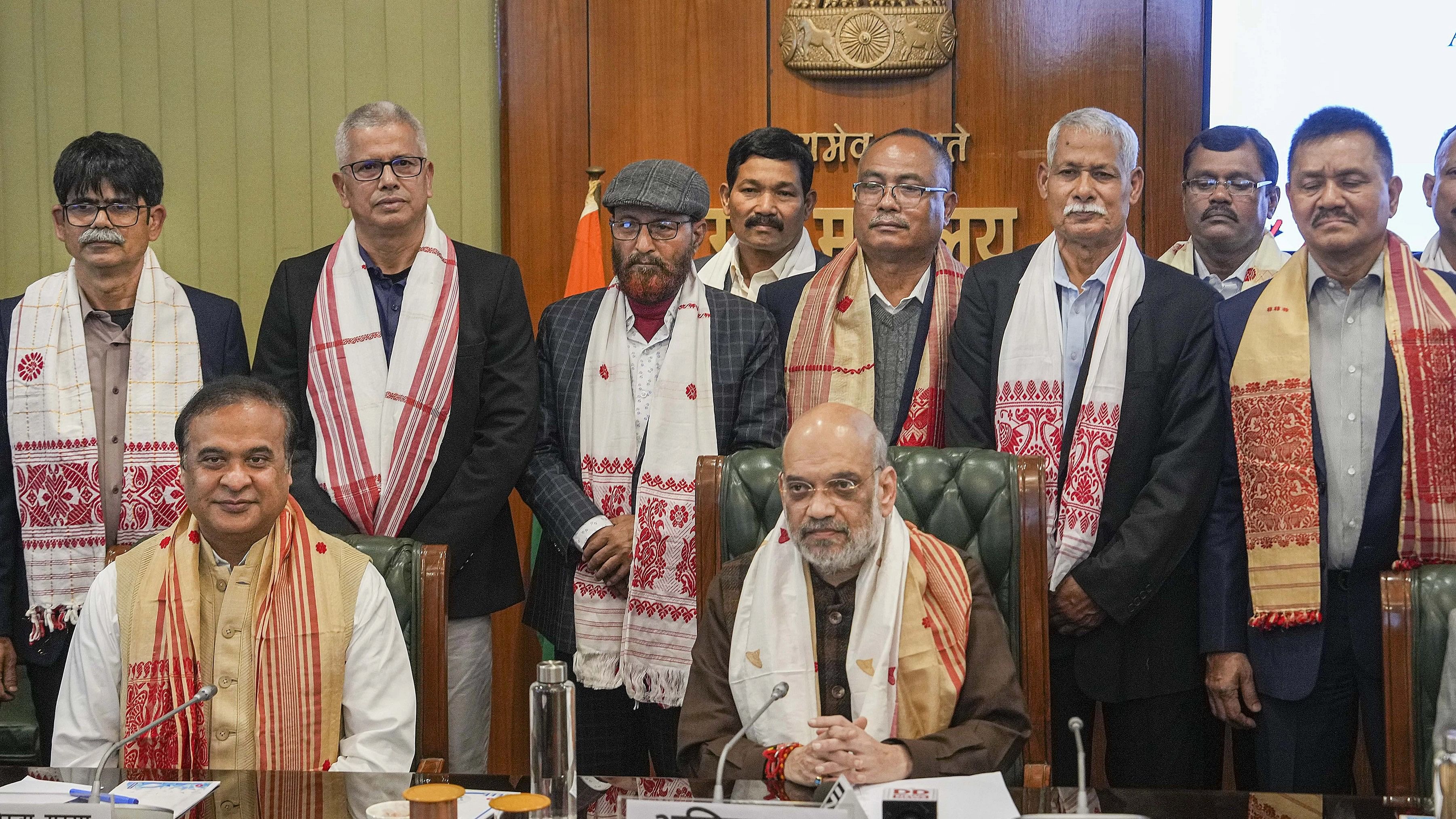
Union Home Minister Amit Shah and Assam Chief Minister Himanta Biswa Sarma with members of United Liberation Front of Asom (ULFA) during signing of a peace accord between ULFA and the central and Assam governments, in New Delhi, Friday, Dec. 29, 2023.
Credit: PTI Photo
New Delhi: Bringing an end to over 44 years of armed resistance, the pro-talks faction of the United Liberated Front of Asom declared that it will dismantle the group, after signing a peace treaty with the Indian government. As part of the peace agreement, the government has agreed to reserve 97 of the assembly seats in Assam to indigenous people, an investment worth Rs 1.5 lakh crore, and declaring the annual Assam floods as “national priority”.
The tripartite deal was signed between the pro-talks ULFA led by Arabinda Rajkhowa, home minister Amit Shah and Assam CM Himanta Biswa Sarma. Representing the ULFA were a 16-member delegation led by Rajkhowa, general secretary Anup Chetia, foreign secretary Sasadhar Choudhury and commander-in-chief Mrinal Hazarika. In addition, 13 members from civil society were part of the deal, which has materialised after 12 years of peace talks. The anti-talks faction of the outfit ULFA Independent led by Paresh Barua are yet to come to the table.
While signing the deal, Shah said that Assam has long suffered from violence. “It is a big day for Assam. Since Narendra Modi became the PM, efforts were made to shorten the gap between Delhi and Northeast. In the last five years, 9 peace and border-related agreements have been signed across the Northeast, because of which peace has been established in major parts of the region,” Shah said.
Sarma said that since the armed struggle began in 1988, over 10,000 people have lost their lives. “The deal marks a historic day for Assam. In the recently concluded delimitation exercise, of the 120 seats we have secured 97 seats for the indigenous people. That principle will continue in the next exercise as well. This deal has solved the feeling of political insecurity of the Assamese people,” Sarma told reporters after the deals were signed.
Chetia and Choudhury, while addressing the press after the deal, said that the parameters of declaring the indigeneity of a person will be in line with the broad guidelines and methodology adopted for the delimitation exercise held in 2023. They said that the Center, as per the accord, has said that it will consider recommending to the Election Commission of India to follow the guidelines in future delimitations in Assam. Some of these parameters are rate of growth of population, density of population, principles of historicity of areas and communities, geographical continuity, physical features, facilities of communication and public convenience, they said.
As per clauses in the Accord, the government will form a committee to examine the reservation for OBCs in Panchayats, adhere to stringent verification of voter registration process to prevent immigrants registering as voters, economic reservation in education and employment, digitisation of land records, setting up of land bank of land freed from encroachment and alloting that to landless indigenous people, and the setting up of a committee to study problems of sick tea gardens.
Choudhury said that the ULFA will be dismantled and they have no political ambitions. He also urged Barua, who he called his mentor, to come to the negotiations table. “He has been my mentor and I think that he will not be upset with our decision; we urge him to come to talk as well,” he said.
Chetia said that the ULFA’s position on the two most contentious issues of the state – the NRC and the implementation of the Citizenship Amendment Act – are clear: “The matters are both sub-jucide and in the case of the CAA, till the verdict of the Supreme Court, it should not be implemented in the state,” he said.
The ULFA, one of the oldest separatist armed outfits of the country, was launched in 1979 in Upper Assam, and by the 1980s, it had launched armed operations. By the 1990s, it was considered one of the deadliest outfits, second only to LTTE, and to some extent the NSCN-IM.
Talks with the pro-talks faction of the outfit began during the UPA government in 2011, with massive resistance from the Barua-led anti-talks faction. Baura is touted to be presently living along the China-Myanmar border.
The tripartite agreement is also the second such after the Modi government signed the Naga Peace Accord in 2015. The move is a significant one for the BJP, and will prove to be a political goal, especially coming ahead of the Congress’s Bharay Nyay Yatra which will trace through the region, spending 4-5 days in the state alone.